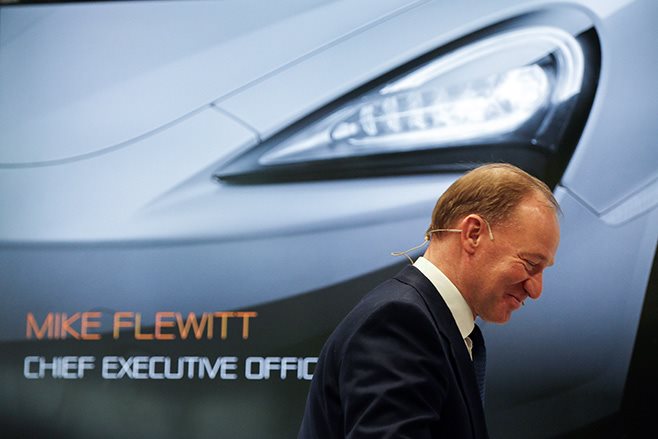► Our sister site Wheels talks to McLaren CEO
► At Bathurst
► What’s next for the brand
Picture in your mind’s eye the boss of a supercar company. Razor thin, perfect hair, tanned a leathery Monaco brown, poised in a perfectly cut Zegna business suit. Luca di Montezemolo, the legendary leader of Ferrari, is the archetype. Or the implausibly fashionable Stephan Winkelmann, who ran Lamborghini and is now at Bugatti.
But McLaren CEO Mike Flewitt is an entirely different proposition; a ruddy-faced, wispy-haired Liverpudlian who began his working life building Ford Escorts on the Halewood assembly line in the early 1980s. He seems a more jeans and tees kind of guy.
Picture in your mind’s eye the boss of a supercar company. Razor thin, perfect hair, tanned a leathery Monaco brown, poised in a perfectly cut Zegna business suit. Luca di Montezemolo, the legendary leader of Ferrari, is the archetype. Or the implausibly fashionable Stephan Winkelmann, who ran Lamborghini and is now at Bugatti.
But McLaren CEO Mike Flewitt is an entirely different proposition; a ruddy-faced, wispy-haired Liverpudlian who began his working life building Ford Escorts on the Halewood assembly line in the early 1980s. He seems a more jeans and tees kind of guy.
‘That’s a little bit where I still am’ Flewitt tells Wheels.
Just a little bit, though. By the time he was wooed away to McLaren Automotive in 2012, just two years after it had been established, Flewitt was a Ford corporate officer overseeing all of its European manufacturing.
‘I’ve still got my production report from my last day at Ford Motor Company,’ he reveals. ‘We built 8700 cars that day in the 23 factories I ran. At McLaren we build 20 a day.
‘I didn’t know any Ford customers. The only way I met a Ford customer was if I went to the pub and the bloke next me said, ‘I’ve got a Ford Focus.’
‘At McLaren, in contrast, I know lots of customers; they all have my email address, they all write to me, they talk to me, we spend time at events.’
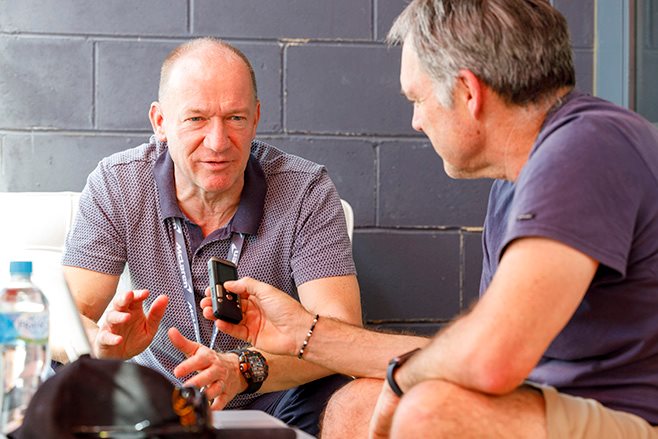
Like this event. Flewitt is sitting on the balcony of the McLaren hospitality suite at Mount Panorama on the Saturday of the Bathurst 12 Hour. Around him, the champagne and beers are being quaffed and the nibblies nibbled by 60 of McLaren’s most valued and loyal Australian and New Zealand customers.
‘I am a little shy, so I’m not great at being thrust into the spotlight or into a more formal showy environment,’ Flewitt says.
‘I enjoy it when I’m with car enthusiasts, because I am a car enthusiast; I can bore people about cars all day long. I love that side of it.’
Indeed, Flewitt even apologises at one point for the length of his answers. But he’s far from boring. He is relaxed, engaging, expansive and revealing. There are no airs and graces, no rote talking points; just a genuine enthusiasm for the car company he runs.
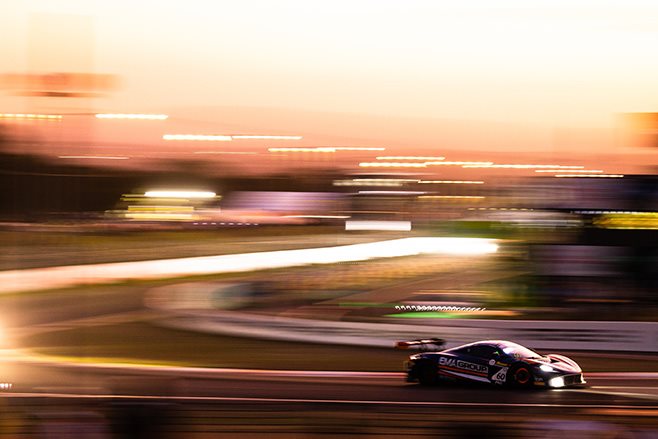
Below us on pit straight, various GT3 sports car exotica are booming, bellowing, howling, growling, whistling and whining past. Among them are two examples of the McLaren 720S GT3 that is making its Bathurst debut.
It is Flewitt’s first visit to Mount Panorama, and the classic racer is impressed: ‘I love it, this is my kind of circuit … I race ‘60s Lotuses mainly and these are the kind of circuits – undulations, not particularly great run-offs necessarily – where you have to be that bit more careful. I love characterful circuits like this.’
The Bathurst debut of the 720S – one would go on to finish second outright and the other to win the Silver class the next day – is one reason Flewitt has made the trip to Australia. He’s also meeting with dealers, customers and the press.
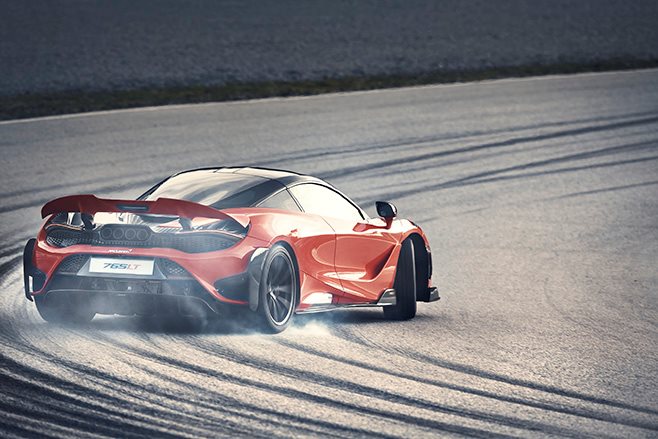
‘In a sense it’s a very easy market for us to relate to,’ says Flewitt. ‘I don’t know if Australians would like me to say this or not, but we [British] feel very much at home. We understand each other culturally as well as sharing a language. It’s not somewhere where we feel we’ve got to translate or interpret McLaren to people.’
That’s undoubtedly helpful, but there’s also no doubting the underlying insecurity of being a small independent car company building ultra-exclusive supercars at an elite price. It can be buffeted severely by circumstances beyond its control.
The climate crisis is all around us as we speak; smoke from the horrific summer bushfires drapes the countryside. The temperature at the circuit is arcing through 40 degrees once more.
Brexit has just become a reality, which means the United Kingdom exiting the European Union into myriad separate global trade deals with key export markets for McLaren such as the USA and China.
When Flewitt gets back to the UK he’ll have to deal with the impacts of the coronavirus. First off, it forces the cancellation of the Geneva motor show and sees McLaren launch its latest model, the 765LT, via video from its own Woking premises. But no-one truly knows the ramifications of this global pandemic.
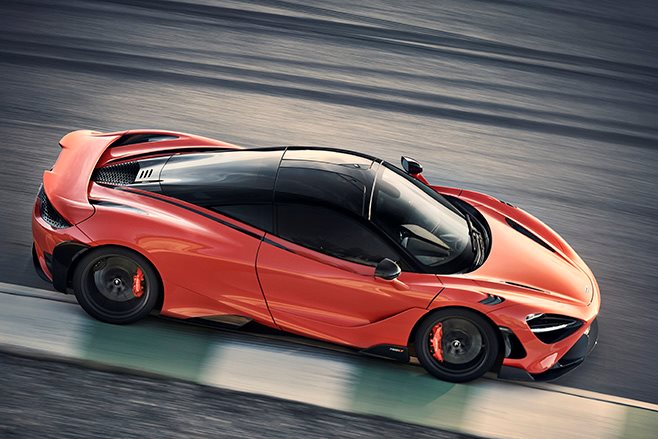
And then there’s fellow British supercar brand Aston Martin. A consortium led by Canadian billionaire Lawrence Stroll has just rescued it from potential collapse. Flewitt is quick to emphasise the differences between McLaren and Aston; McLaren Automotive’s owners have no plan to go public and there’s no desire to expand from supercars into SUVs or go for rapid sales growth. McLaren’s Track25 business plan pegs sales at 4500-5000 for some years.
‘I don’t think there are 10,000 McLarens to sell,” Flewitt admits. ‘If we get one message from our customers, it’s don’t build too many cars.
‘I hope things work out for Aston,’ he adds. ‘It’s no good for this industry having a brand like that struggling and in trouble. We have common customers, common dealers, we’re in the same market. It definitely casts a view when you go talk to investors, banks and so on.
‘I think [Aston] has taken a very different approach from us. I sometimes wonder whether people think we are conservative or ambitious with what we have done with McLaren, because we have done a lot in eight years.
‘But we have stayed very true to the concept of making supercars. That’s a question I get in some markets: ‘Are you guys going to do an SUV?’, or ‘Are you guys going to do an EV?’ The answer is no, we’re not.
‘The answer ‘no’ is an entirely rational one. Our brand is completely grounded in motorsport, supercars and drivers’ cars. It is way too early to be stretching the brand into other areas and trying to give brand credibility to a product that clearly has nothing to do with our history.’
Instead, the next big step for McLaren will be into plug-in hybrid powertrains. To do that, an all-new platform has been developed to replace the P11 carbonfibre structure that has been employed since the first McLaren automotive model, the 12C, debuted in 2011.
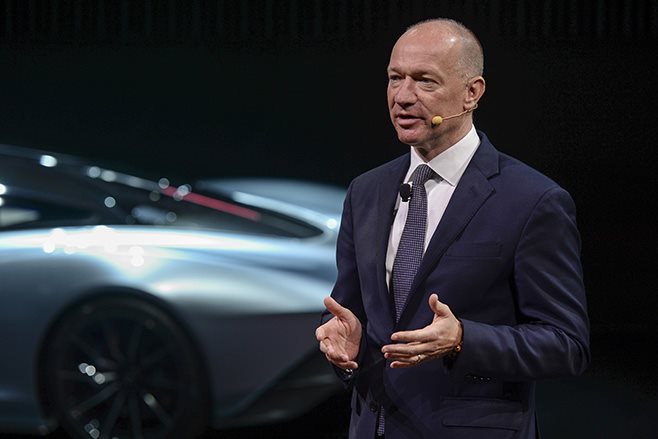
‘I’m honest enough to say we only hybridise cars to meet environmental legislation to stay compliant, but we have managed to harness the technology to make a more exciting car with better attributes to it, so it makes sense,” says Flewitt. ‘By designing it into a platform we’ve been able to be a lot more efficient … Efficient from a packaging perspective, efficient from a weight perspective and a cost perspective.”
While a parallel hybrid system has featured in the ultra-expensive Ultimate series P1 and Speedtail, the PHEV that appears at the end of 2020 will be all-new. That car will join the Sports Series line-up – 540, 570, 600 – and eventually replace it. The Super Series cars – 720, 765 – will go the same way, as will the new GT.
‘After 2022-23 I can’t see us launching any non-hybrid cars,’ Flewitt reveals.
The numbers he is forecasting are impressive. The weight penalty for the PHEV system is just 30-40kg, the electric-only range will be about 19 miles and claimed emissions will be under 100 grams of CO2 per kilometre. Performance will be boosted as well, although on this Flewitt won’t be drawn into specifics.
Then he drops a tantalising hint that he knows will resonate in Australia.
‘The V8 will still be in the line-up,’ he assures Wheels. ‘But we might have more than that. I’m not going to say anything beyond that.’
It’s a fair bet he’s hinting at a V6.
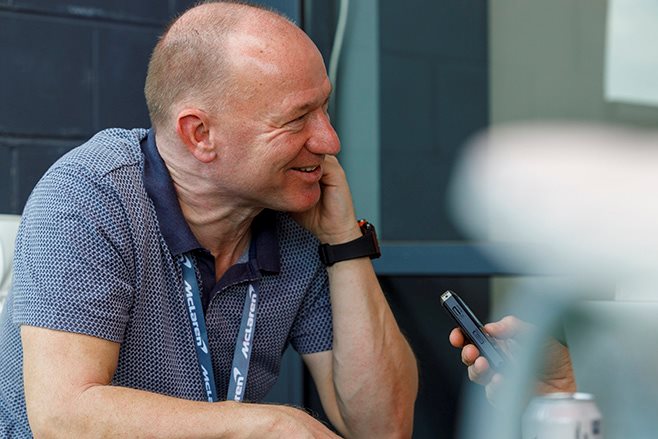
‘It will be a better supercar and one that is more compliant going forward,’ Flewitt adds, as if to assuage any fears a V6 PHEV won’t be a true McLaren supercar. ‘That’s what we needed to engineer if we’re really going to drive this market forward.
‘We’re about putting the driver first; making the car phenomenal to drive, making it real so the thing’s got credibility,’ he concludes. ‘We’re a young car brand – if we’re not real we’ve got no future.’
It’s a declaration delivered with passion and conviction. Flewitt’s automotive education from Halewood to Woking via Elizabeth and other stops along the way has delivered McLaren an authentic leader.
He seems as real as the business he runs, even without the business suit.
